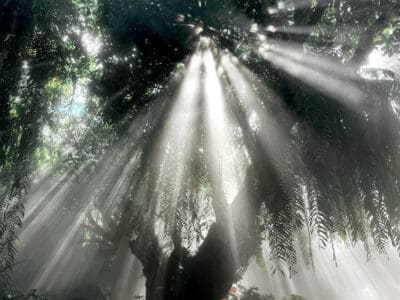What is the kingdom of God like?
Ezekiel 17:5-6,12-14, 22-24
Some of the most fascinating and perplexing prophetic images in the Old Testament come from the book of Ezekiel. From the opening chapter in which Ezekiel has a vision of the likeness of the glory of God that basically stretches language to its breaking point to the final nine chapters which center around a visionary temple complex that has never been built, Ezekiel is a challenging book. The prophet Ezekiel lived during the time of the exile to Babylon, and he was writing to give conviction of sin to Israel as well as hope for their future. Conviction of sin, because the exile had been caused by Israel’s stubborn commitment to wickedness and idolatry. Hope for the future because the Jewish nation may well have wondered if they would ever be allowed to live in the favor of God again, restored to their Promised Land with their Promised King ruling over them from the lineage of David.
Concerning that last aspect, the lineage of David was by then an utter failure. Deeply corrupt in sin and utterly humiliated by the Babylonians, it seemed impossible for a future Davidic king to arise out of a line so thoroughly trampled into the mud. Degraded through their wickedness, they were devastated militarily by Nebuchadnezzar. Stripped of power, a puppet king from their family line was put on an insignificant throne. Could a Son of David ever rise from that to rule in glory?
“This is nothing less than the eternal Kingdom of Jesus Christ, rising from absolute obscurity under Gentile domination to fill the whole world with its power and glory.”
Ezekiel 17 helped describe that time of humiliation and also give a promise of future exaltation. The passage says that the king of Babylon went to Jerusalem and carried off her king and the nobles. He put a family member on a throne specifically so that the kingdom would be brought low… like a low, spreading vine crawling on the ground. God made it plain that this humiliation was part of Israel’s punishment for their sins. It would stay low as long as God willed, surviving only by the whims of her Gentile overlords.
But not forever! For the chapter ends with a shoot being snipped off from the top of a cedar and carried back to the Promised Land where it would become a majestic tree with fruit on every branch and shade under every bough. This is nothing less than the eternal Kingdom of Jesus Christ, rising from absolute obscurity under Gentile domination to fill the whole world with its power and glory.
Therefore we see Jesus born under the rule of Caesar Augustus, his parents forced to go to Bethlehem for the purpose of registering for the census. And we see Jesus dying under the rule of Caesar as well, crucified by Pontius Pilate. Yet despite his seeming lowliness we know that Jesus’ Kingdom is infinitely glorious, ruling over all the nations of the earth, like a majestic cedar whose branches give protection and provision for all eternity. From the lowliness of the manger to the loftiness of the heavenly throne… all this is pictured in Ezekiel 17.





